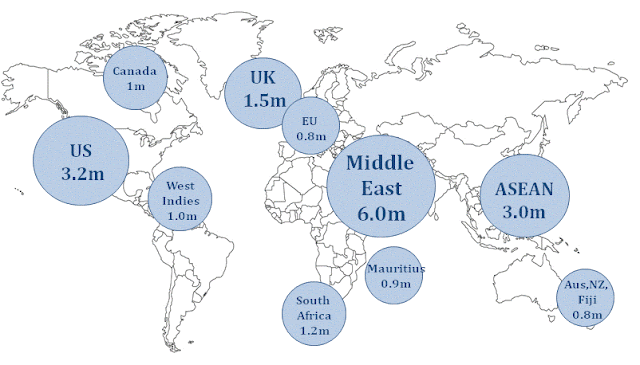India and its Diaspora
Every year, governments of various Indian states roll out the red carpet for its diaspora. The shining, the leading, the welcoming and the emerging compete to attract the attention of prodigal sons (and some daughters), putting up ever better shows and ever sweeter promises. Hundreds of MoUs get signed and Ministers get their headlines for bringing jobs and prosperity. And, then, carpets are rolled up, everyone goes home and mostly nothing happens. It is tempting to think that this is typical of government jamborees, but this also reflects how India treats its diaspora.
Despite all the new-found love, India never had a Deng Xiao Ping moment of wanting to learn from the diaspora. While it is country with a large English-educated young population, which is expected to be footloose, it has treated its diaspora with a mix of indifference - these are the people who left - and greed - whose remittances home kept the exchange rate in check. But while it wanted its money, its opinions and participation were never really welcome. Whether the attitude dates back to the early modern Hindu doctrine of people losing their castes when they crossed the sea, or the more contemporary attitudes of countries such as the Philippines or Bangladesh, which sees its manpower as 'export' to bring Dollars home, the diaspora for India remained the people who should be left at arms length.
This is symptomatic. India, along with China, has been a big beneficiary of globalization, but it may not have not come to terms with it. In its dealing with the world, India still remains in thrall of its colonial past, too slavishly attached to London (some Indian cities want to rebuild themselves after it) and too ignorant and fearful about everything else. Kishore Mahbubani's observation that India is an open society with a closed mind (in contrast to China, a closed society with an open mind) is indeed justified. And, the preoccupation of keeping outsiders out ruled out any serious engagement with the diaspora.
It must be said that Indian diaspora remains ambivalent about India too. While they remain culturally connected to culture and customs of their own communities, the political entity of being Indian did not come naturally. While they regularly sent money to their relatives in India, bought shares and property and traveled once a year, these engagements remained personal and opportunistic. For a diaspora Indian, India was often an opportunity - particularly of buying some real estate to buy on cheap and sell dear - but not one to make any further engagement. Going back was out of question: A nice dinner table conversation! In fact, 'opportunity' and 'challenge' are perhaps the two most common words diaspora Indians used for India more often than any other. But this means that they never pulled the collective weight for India and their investment remained limited to financial assets and real estate and not translated in factories and businesses as the Chinese diaspora has done.
Indian policy-makers belatedly caught on the idea of soft power, and waxed lyrical about Bollywood in Bolivia (and assorted myths of Kyunki stopping fighting in Kabul), a strategic engagement with its diaspora was never the agenda for them too. Indeed, party leaders and ministers considered foreign good for business, as such trips made news and sometimes raised some money, but this was usual pork-barrel politics than engagement with diaspora. But any further engagement with diaspora was problematic. When the Indian parliament took several years even to take a 'baby step' of allowing proxy voting by non-resident Indians, which the ministers held as a momentous step, though it made many diaspora Indians without a vote realise for the first time that even such a basic right did not exist.
In fact, the vote for diaspora Indians is no one's issue at the time. The ruling Bharatiya Janata Party, well-positioned to cultivate diaspora connections through the extensive RSS and other Hindu networks, remains somewhat complacent as no one else is really competing for influence. Indian politics is regionally obsessed and migrants voting in elections have little benefits to near-sighted political parties. The usual excuse offered is that the India's own poor and dis-empowered communities needs to be granted political rights first. This is a valid point except explaining why these have to be mutually exclusive. The real reason is that there is no political compulsion for this - once the billionaire diaspora is taken care of, the diaspora of normal people is of little interest to the political parties.
But there is a reason why India may need its diaspora, and soon. By more than one count, we are at a tipping point of globalisation. The globalisation induced prosperity of the last generation is already passe. India, with its poor infrastructure, underdeveloped higher education system and broken healthcare, is likely to miss the shift, if it can't harness diaspora knowledge and engagement. The global political shifts also make the obsolete nature of India's geopolitics obvious: If India's development story starts showing cracks, it is likely that the lobbying powers of separatist groups (like Khalistanis) would start challenging Indian interests in almost all major nations. At a time when United States, Russia, China and Europe start jostling for global prominence, diaspora is India's only 'affordable' way of getting a global voice.


Comments